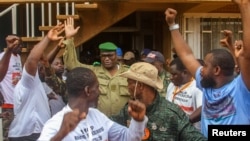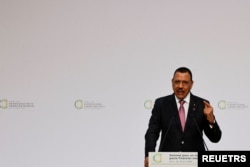West African leaders say they will meet on Thursday to discuss the crisis in Niger after the country’s military rulers defied a deadline to reinstate the ousted president or face a possible military intervention.
The Economic Community of West African States (ECOWAS) said it would hold an extraordinary summit Thursday in Abuja, the capital of neighboring Nigeria, according to spokesperson Emos Lungu.
After the ECOWAS deadline passed Sunday for Niger’s military to stand down and restore President Mohamed Bazoum, military leaders there issued a pledge to defend the country and closed Niger’s airspace.
"Niger's armed forces and all our defense and security forces, backed by the unfailing support of our people, are ready to defend the integrity of our territory," a junta representative said in a statement on national television.
The spokesman said any attempt to fly over the country will be met with “an energetic and immediate response.”
International airlines have begun to divert flights around Niger's airspace. The United Nations said its humanitarian flights have also been grounded because of the closed airspace.
Also Monday, neighboring Mali said it and Burkina Faso would send a delegation of officials to Niger to show support for the military rulers.
Both countries — which have fallen to military coups in recent years — have said military intervention in Niger would be tantamount to a declaration of war.
Alex Vines, the head of the Africa program at think tank Chatham House, told VOA that he is not surprised Mali and Burkina Faso have supported Niger.
“They're afraid of a regional economic community intervening and restoring democracy. And that's not what they stand for,” he said.
Another nation led by coup leaders, Guinea, has also expressed support for Niger’s military takeover.
Vines said he was surprised by Guinea’s support because the junta there has been trying to distance itself from the other juntas.
“I guess it shows how fearful they are that a values-based intervention that is about preserving and supporting democratic processes and accountable government is something that they don’t welcome,” he said.
On Friday, West African defense chiefs drew up a plan for a possible military intervention in Niger if the country’s military leaders did not release and reinstall Bazoum.
"All the elements that will go into any eventual intervention have been worked out here, including the resources needed, the how and when we are going to deploy the force," Abdel-Fatau Musah, ECOWAS commissioner for political affairs, peace and security, said Friday.
The 15-nation bloc has sent military forces into member states in the past. However, it is not clear if ECOWAS members will support military action in Niger to resolve the current crisis.
Nigeria’s Senate urged the bloc to focus on political and diplomatic options instead of the use of force.
Italy urged ECOWAS to extend the deadline for Niger’s military leaders to back down, and called for a diplomatic solution.
"A solution must be found. It's not set that there is no way other than war," Italian Foreign Minister Antonio Tajani told La Stampa newspaper.
Niger’s military rulers have not shown much interest in negotiating.
An ECOWAS diplomatic delegation that arrived in Niger's capital, Niamey, on Thursday ended up leaving without meeting junta chief General Abdourahamane Tchiani or Bazoum.
Residents in Niamey have been stockpiling food and supplies in anticipation of a tense week ahead. Some have expressed support for the coup and used the situation to express anti-French sentiment. Protesters in Niamey on Sunday slaughtered a rooster —a national symbol of France — painted with the country’s tricolor.
U.N. Secretary-General António Guterres reiterated Monday his “full support to ECOWAS’ ongoing mediation efforts,” and expressed concern over the continued detention of Bazoum and the failure so far to restore constitutional order in Niger, according to a U.N. spokesperson.
Besides the United Nations’ reaction, the coup has been widely condemned by the African Union and Western governments. U.S. President Joe Biden called Thursday for Bazoum's immediate release, adding that Niger is "facing a grave challenge to its democracy."
The U.S. paused some aid programs that benefited the government of Niger, Secretary of State Antony Blinken said in a statement on Friday. But he said humanitarian and food aid would continue.
The State Department said Monday the paused aid is valued at more than $100 million and includes development assistance, security assistance and law enforcement assistance.
State Department spokesperson Matthew Miller said the suspended aid could be reversed if Niger’s military leaders reinstate the elected government.
“If the junta leaders would step aside and restore constitutional order tomorrow, that pause would … go away and security systems would be reinstated,” he said.
Miller said U.S. officials are still able to communicate with Bazoum and that their most recent contact was on Monday. He also said there has also been direct U.S. contact with Niger military leaders, urging them to step aside.
Niger, one of the world’s poorest countries, has the highest fertility rate in Africa and depends heavily on foreign aid.
Bazoum, who has been under house arrest with his family since July 26, described himself in a Washington Post column Thursday as a “hostage,” and warned that if the mutiny proved successful, "it will have devastating consequences for our country, our region and the entire world."
He called on "the U.S. government and the entire international community to help us restore our constitutional order."
On July 26, Tchiani, the former head of Niger's presidential guard, declared himself the country’s new leader, saying the power grab was necessary because of ongoing insecurity in the country caused by an Islamist insurgency.
Niger has been a partner in the fight against counterterrorism in the Sahel, where militants linked to al-Qaida and Islamic State are operating. Both the United States and France have troops in Niger focused on counterterror operations.
Last week, Niger’s military leaders read a decision on national television ending bilateral military agreements with France, Niger’s former colonial ruler.
It is not clear what will happen to the French military presence consisting of 1,500 troops or the 1,000 U.S. military personnel in the country.
Pentagon officials said Monday there was “no change” to the force posture of the of U.S. troops in Niger and no plans to evacuate them.
VOA correspondents Anita Powell at the White House and Margaret Besheer at the United Nations contributed to this report. Some information for this article came from The Associated Press, Agence France-Presse and Reuters.










